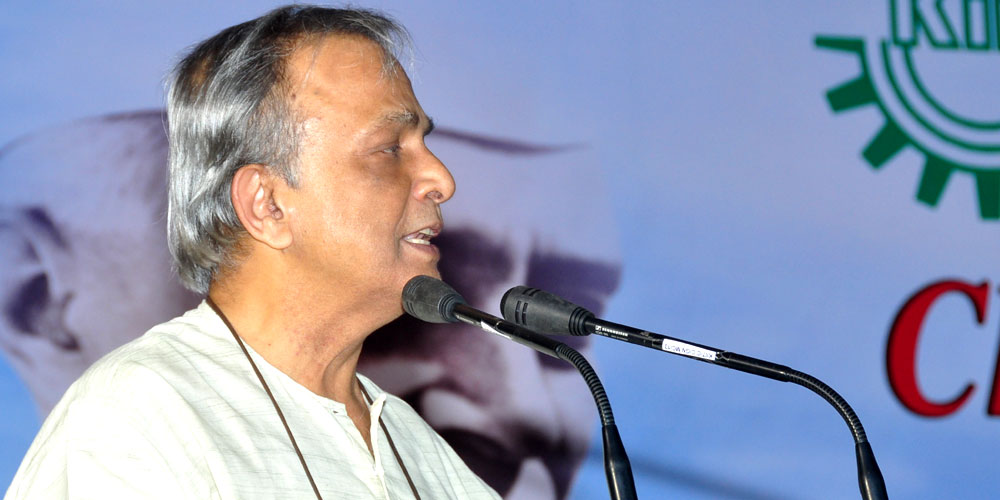As Law School transitions from one Vice-Chancellor and the next, we find ourselves at the threshold of new possibilities. We are the oldest institution of our kind in this country and yet we are young enough to remember the past that got us to the point where we are. This series of interviews has been put together in order to gain some insight into what Law School once was, and what the future ought to be. We hope for this piece to be a glimpse into the past and a vision for the future whilst in the interim. We begin the series with a conversation with a former Vice-Chancellor and Founding Faculty member, Prof. N.L. Mitra.
All responses are Prof. Mitra’s own opinion.
This interview was conducted by Lakshmi Nambiar (Batch of 2023) and Apoorva Nangia (Batch of 2023).
When were you the Vice-Chancellor of NLSIU?
At the time it was not called Vice-Chancellor, it was called Director. It was at my time that the UGC said that Directors are also Vice-Chancellors. I became Director in 1997 and remained in office till 2000.
What was the process for appointing the Vice-Chancellor at the time of your appointment?
The procedure was simple – there was a Search Committee. The Search Committee had to search all over India, find the tallest person, and recommend three names to the Executive Council (EC). The EC would then propose one name to the Chancellor (at that time known as Visitor), the Chief Justice of India.
In the middle of March in 1997, Prof. Madhava Menon, my predecessor and Founder Director of NLSIU, called me and told me that my name had been proposed for the post of Director (Vice-Chancellor) of NLSIU. So my name was given by the EC, Prof. Menon carried it to the Chancellor, got the clearance, and the letter of appointment was given by Prof. Menon to me. By the end of March, within about two weeks perhaps, I received a letter – it was a matter of few days – my appointment had been accepted by the Chancellor, the CJI, and I was appointed.
In the case that the Chancellor didn’t accept the EC’s recommendation, he could refer it back and if they reiterate the same name, he is obliged to appoint. However, there was no occasion like that as the EC would not re-propose the same candidate if the CJI rejected it in the first instance.
Was there a process of accepting applications for the post of Vice-Chancellor?
No, it was the Search Committee. Actually, Vice-Chancellors during that time, from time immemorial, were appointed by Search Committees, not selected from a pool of candidates who applied for the post. Now, everybody appoints, or everybody demands that “I am also qualified to be VC” – but I never demanded, I never applied, neither did Prof. Menon. Vice-Chancellors are honourable persons, so they must be tall enough, people must recognise them. Then the Search Committee proposed three names, and that’s how I was appointed. Prof. Menon took the decision of the EC to the Chancellor, there must have been a file, he must have signed yes, and Prof. Menon drafted the letter of appointment and gave it to me.
Was there any involvement of the Registrar in the appointment of the Vice-Chancellor during your time?
No.
There was no question of the Registrar anywhere – the Vice-Chancellor was the one who would carry the file to the Chancellor, get it signed and approved, and issue the letter of appointment to the selected candidate for the post of Vice-Chancellor.
At the time if the EC did not approve of any of the three names put forth by the Search Committee, what would happen in such a case?
It is not a written law, but it is a common law principle, that the Chancellor may refer back to the Executive Council to reconsider. And he is such a tall person, if he refers back, the EC will deliberate. But for the Executive Council to reject all three names proposed by the Search Committee, would be dishonouring the Search Committee.
How did you conduct the process, when your successor was to be appointed?
When my successor was to be appointed, in the year 2000, a Search Committee was constituted which submitted three names – at that time people started lobbying for others. But lobbying was not there at the time of my appointment. The Chief Justice at the time referred the decision back to be considered – formally or informally, I am not sure. But there was a controversy – there was a debate in the Executive Council itself between the two candidates.
I became a kind of tennis ball in the middle of this, so I safely abstained. At that time, what happened was after waiting for some time, I felt it was not right for me to abstain. I went to the Chief Justice, as there was a time within which this had to be done – but the decision between the two people was left to the Chief Justice. There was no decision that could be made by the Executive Council.
Despite external factors, the matter was resolved quickly. Without my asking the Chief Justice to make the decision, there might have been a stalemate. A stalemate would have been problematic, because I might have been asked to continue. The law is that until the next person joins, the current Vice-Chancellor has to continue.
Under what conditions could a Search Committee’s recommendations be rejected?
What was done in the case of another university, the Search Committee put forth three names – one of which was a “super name”. But, Chief Justice, without looking at that list directly appointed somebody else. It was not the Executive Council, but the Chief Justice which set aside the Search Committee’s recommendations. Obviously, there are danger signals. But whatever the Chief Justice has to do, Chief Justice should do it even if he doesn’t like Krishnaswamy. I don’t know how much difference Krishnaswamy will bring to the National Law School. But, he is a very good choice, a brilliant boy, our student – he is a Rhodes scholar even. I would be very proud if he was to become the Vice-Chancellor – all the National Law School teachers ought to be proud.
What do you think about the student’s efforts to ensure completion of the process?
I am disturbed about the delay, and something should be done at the earliest to ensure completion of the process. And it is obvious that students are also disturbed. But it is not good sitting over there and making a strike – because it attracts the newspaper and it is a wrong coverage in a wrong way. Those who are employers take this kind of attitude very seriously when they recruit. It is not a healthy sign. You need to handle the newspaper coverage properly – they haven’t depicted the students in the best light.
But the procedure of VC appointment is very simple – a simple procedure for simple people – not to be made complex. I do not know where all the complexities, and the involvement of other people comes in. And why the Chief Justice is not signing it yet, I am not sure – there is a file, the resolution is given, the resolution must have been drafted by the EC, that out of the three names we recommend this person, and this resolution must be taken by the Vice-Chancellor and given to the Chief Justice. The Chief Justice would not talk to anyone less than the Vice-Chancellor. It is as simple as this – Prof. Menon did that, I also did that, but it isn’t happening currently – so that means it is not in their priority list.


Comments